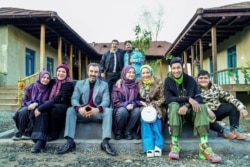Until recently, the Iranian television series Paytakht (Capital) was praised for promoting state policies -- including Tehran's support for Syrian President Bashar al-Assad -- while also attracting viewers who usually watch satellite TV for entertainment.
But Paytakht has recently been accused by hard-liners of being manipulated by Iran’s enemies for perceived immoral content and scenes that resemble those from prerevolutionary hit shows banned under the country's strict theocracy.
The criticism has prompted the head of state-controlled television, Abdolali Ali Asgari, to order an investigation into whether a "mistake or negligence" was behind the questionable scenes or whether they were the result of a “secret operation” by an unnamed enemy.
“It is expected that necessary steps will be taken to prevent such incidents from recurring,” Asgari said in a letter to his deputy that was quoted in Iranian media. The letter vowed action against “violators.”
The comedy series, released through six seasons over the course of nearly a decade, is about a family from a small northern town that migrates to the Iranian capital, Tehran.
It was produced by the heavily censored state TV broadcaster, which is controlled by hard-liners, and Owj media, a company with ties to the Islamic Revolutionary Guards Corps (IRGC).
In one of the sequences in the final episode of Paytakht 6 that aired recently, newlyweds are riding a motorbike on the roads of northern Mazandaran Province.
The scene reminded many of hit shows from before the 1979 Islamic Revolution, including the 1975 romantic drama Hamsafar (Fellow Traveler), which featured two of the country’s most acclaimed artists: pop singer Googoosh and actor Behrouz Vossoughi. Both currently live in exile.
In a well-known sequence from Hamsafar, Googoosh and Vossoughi are riding a motorbike back to Tehran after a trip to the north.
The news site Fararu.ir said in a recent report that, in the eyes of critics, the similarity is “unforgivable.”
The ultra-hard-line Kayhan said the sequence was an “homage” to cinema from the era of the Shah of Iran and actors who were banned after the revolution.
There was also criticism from media affiliated with the powerful IRGC.
Javan, which has ties to the IRGC, wrote that Manoto -- a London-based TV channel -- had "broadcast Hamsafar on Friday noontime. The same night, the first channel of state TV airs the series Paytakht with reference to [Hamsafar] and another [prerevolutionary hit] Mamal Amricayi.”
“How can a counterrevolutionary TV channel be, to this degree, coordinated with the state broadcaster?" Javan asked.
Others criticized Paytakht for a scene in which a couple’s bed is visible, which they say is a sign of decadence and a violation of taboos on state TV, where romantic scenes or scenes of men and women sitting too close to each other are blocked and censorship can reach absurd levels.
Meanwhile, Iranian media have reported that the deadly outbreak of the coronavirus in Iran -- by far the worst-hit country in the Middle East -- and the recent controversy about Paytakht could delay future episodes of series.










